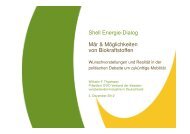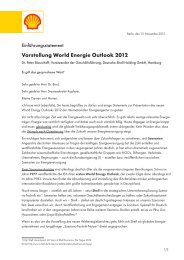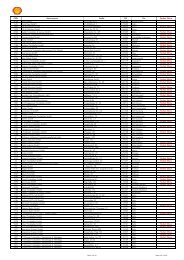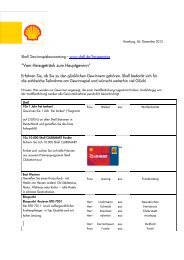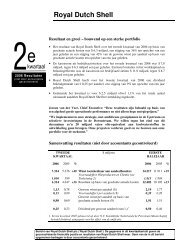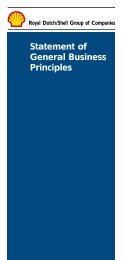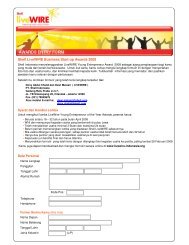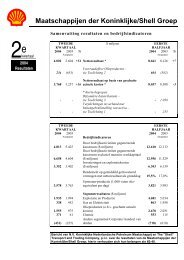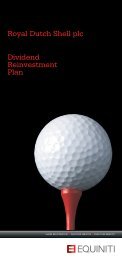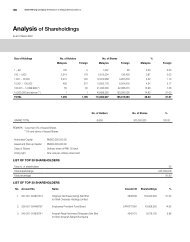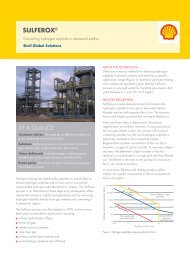62414 sustain 40pp (Mag)
62414 sustain 40pp (Mag)
62414 sustain 40pp (Mag)
You also want an ePaper? Increase the reach of your titles
YUMPU automatically turns print PDFs into web optimized ePapers that Google loves.
REPORTING ON WHAT MATTERS MOST<br />
Sustainability reporting must focus on the environmental and social issues<br />
that matter most to a company and its stakeholders. That is why we have<br />
again selected “Meeting the Energy Challenge” as our theme; why we use<br />
key performance indicators that were developed with our stakeholders to<br />
report on our biggest environmental and social impacts; and why we use a<br />
well-established and auditable process to select the issues to cover.<br />
Global media review<br />
Website hits<br />
Reader surveys<br />
Socially responsible<br />
investment reports<br />
and indexes<br />
Shell public<br />
policy review<br />
High<br />
IMPACT ON SOCIETY<br />
Low IMPACT ON SHELL STRATEGY<br />
High<br />
Shell strategy<br />
Shell risk<br />
management<br />
process<br />
Shell reputation<br />
management<br />
process<br />
Step 1. Ask readers what matters most to them, using surveys, interviews,<br />
media reviews and workshops with reporting experts.<br />
Step 2. Use our internal risk management systems to determine which<br />
environmental and social issues most affect our business strategy.<br />
Step 3. Combine the results (see figure). Allowing for legal restrictions, we<br />
include all the highest-priority topics in our Report. Those at the next<br />
level of importance are covered on our website.<br />
Step 4. Check with stakeholders, and our External Review Committee, that<br />
our coverage of these topics is balanced and complete.<br />
The Committee helped us refine this process in 2006. The weightings used in<br />
Step 1 now take more account of topics that are important for society but<br />
attract less media attention.<br />
Share your opinion<br />
Please let us know your views on this Report, or any issues it raises,<br />
by e-mail to <strong>sustain</strong>abilityreport@shell.com.<br />
LEGAL DISCLAIMER<br />
The companies in which Royal Dutch Shell plc directly and indirectly owns<br />
investments are separate entities. In this Report, the expressions “Shell”,<br />
“Group” and “Shell Group” and references to Shell as a “company” are<br />
sometimes used for convenience where references are made to Group<br />
companies in general. Likewise, the words “we”, “us” and “our” are also used<br />
to refer to Group companies in general or those who work for them. These<br />
expressions are also used where there is no purpose in identifying specific<br />
companies. Terms such as “Shell Trading”, “Shell Hydrogen”, “Shell Wind<br />
Energy” and “Shell Solar” refer to the various companies engaged in trading,<br />
hydrogen, wind and solar businesses, respectively.<br />
This Report contains forward-looking statements concerning the financial<br />
condition, results of operations and businesses of Royal Dutch Shell. All<br />
statements other than statements of historical fact are, or may be deemed to<br />
be, forward-looking statements. Forward-looking statements are statements<br />
of future expectations that are based on management’s current expectations<br />
and assumptions and involve known and unknown risks and uncertainties<br />
that could cause actual results, performance or events to differ materially<br />
from those expressed or implied in these statements. Forward-looking<br />
statements include, among other things, statements concerning the<br />
potential exposure of Royal Dutch Shell to market risks and statements<br />
expressing management’s expectations, beliefs, estimates, forecasts,<br />
projections and assumptions. These forward-looking statements are<br />
identified by their use of terms and phrases such as ‘‘anticipate’’, ‘‘believe’’,<br />
‘‘could’’, ‘‘estimate’’, ‘‘expect’’, ‘‘intend’’, ‘‘may’’, ‘‘plan’’, ‘‘objectives’’,<br />
‘‘outlook’’, ‘‘probably’’, ‘‘project’’, ‘‘will’’, ‘‘seek’’, ‘‘target’’, ‘‘risks’’, ‘‘goals’’,<br />
‘‘should’’ and similar terms and phrases. There are a number of factors that<br />
could affect the future operations of Royal Dutch Shell and could cause<br />
those results to differ materially from those expressed in the forward-looking<br />
statements included in this Report, including (without limitation): (a) price<br />
fluctuations in crude oil and natural gas; (b) changes in demand for the<br />
Group’s products; (c) currency fluctuations; (d) drilling and production<br />
results; (e) reserve estimates; (f) loss of market and industry competition; (g)<br />
environmental and physical risks; (h) risks associated with the identification<br />
of suitable potential acquisition properties and targets, and successful<br />
negotiation and completion of such transactions; (i) the risk of doing<br />
business in developing countries and countries subject to international<br />
sanctions; (j) legislative, fiscal and regulatory developments including<br />
potential litigation and regulatory effects arising from recategorisation of<br />
reserves; (k) economic and financial market conditions in various countries<br />
and regions; (l) political risks, project delay or advancement, approvals and<br />
cost estimates; and (m) changes in trading conditions. All forward-looking<br />
statements contained in this Report are expressly qualified in their entirety<br />
by the cautionary statements contained or referred to in this section.<br />
Readers should not place undue reliance on forward-looking statements.<br />
Additional factors that may affect future results are contained in Royal<br />
Dutch Shell’s Form 20-F for the year ended December 31, 2006 (available<br />
at www.shell.com/investor and www.sec.gov). These factors also should be<br />
considered by the reader. Each forward-looking statement speaks only as of<br />
the date of this Report, 8 May 2007. Neither Royal Dutch Shell nor any of<br />
its subsidiaries undertake any obligation to publicly update or revise any<br />
forward-looking statement as a result of new information, future events or<br />
other information. In light of these risks, results could differ materially from<br />
those stated, implied or inferred from the forward-looking statements<br />
contained in this Report.<br />
CREDIT<br />
Design: Flag<br />
Editing: Context<br />
Cover photography: Adrian Burke<br />
Board and External Review Committee photography: Jaap van den Beukel<br />
Additional photography: Biodiversity, Ben Seligman; Pinedale,<br />
Wilmer Gaviria; Air Pollution, Alex Nevill<br />
Print: Taylor Bloxham under ISO 14001<br />
Paper: Revive 50/50<br />
PAPER SPECIFICATION<br />
The paper used is made from 25% de-inked post-consumer waste, 25%<br />
pre-consumer waste and 50% virgin fibre under ISO 14001. All pulps<br />
are Elemental Chlorine Free. The use of the FSC logo identifies products<br />
which contain wood from well-managed forests certified in accordance<br />
with the rules of the Forest Stewardship Council.<br />
THE SHELL SUSTAINABILITY REPORT 2006 41


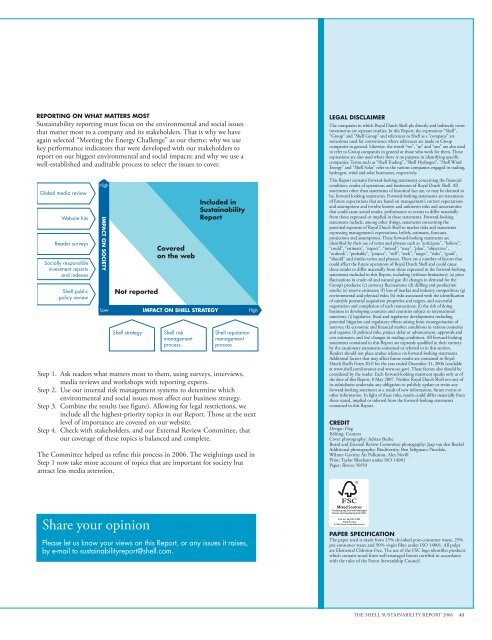
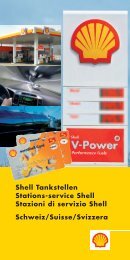
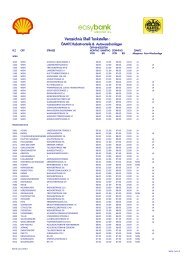
![Download Shell AutoGas Stationen [Stand: Januar 2013] (PDF](https://img.yumpu.com/9982753/1/190x245/download-shell-autogas-stationen-stand-januar-2013-pdf.jpg?quality=85)
